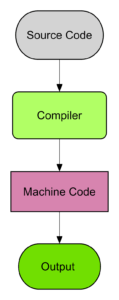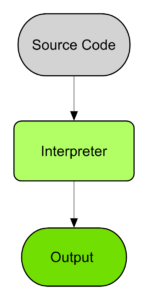Difference Between Compiler And Interpreter in Tabular Form with Diagram
| Sno. | Basic Term | Compiler | Interpreter |
| 1. | Diagram |  Compiler Execution |  Interpreter Execution |
| 2. | Definition | Compiler process entire program and converts into object code which is stored in file. | Interpreter directly execute instruction written in a program or scripting language without previously them to a object code one statement at a time. |
| 3. | Object | Its Generated intermediate code | Its doesn’t Generated intermediate code |
| 4. | Machine code | Store machine language as machine code on the disk | Not Save Machine Code |
| 5. | Programming language | C, C++ use compilers. | Python, Ruby use interpreters. |
| 6. | Machine code Translates | Scans the entire program | one statement at a time. |
| 7. | Memory Efficient | Generates intermediate object code which further requires linking | No intermediate object code is generated, hence are memory efficient. |
| 8. | Error Message (Debugging) | After Whole Code Compiled | Where first error is met |
| 9. | Speed | Fast | Slow |
| 10. | Source Code Requirements | After Compiled Programming code not needed to run program | Source code requirement every time run the program |
(Visited 930 times, 1 visits today)
Written by: